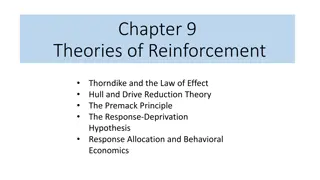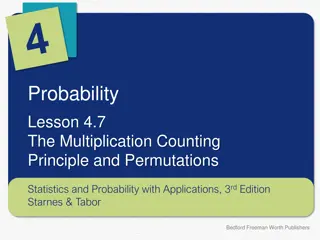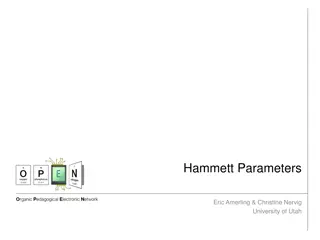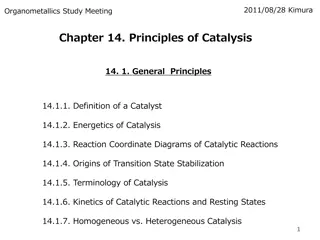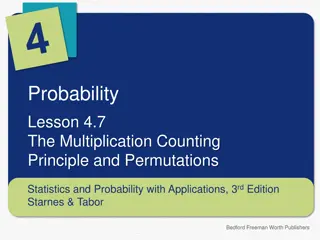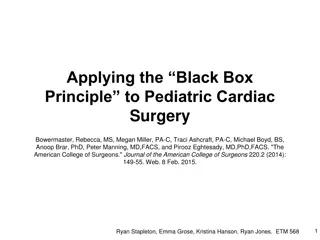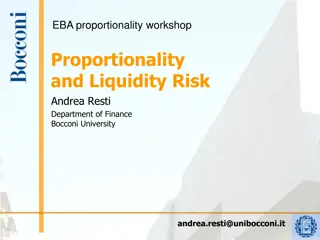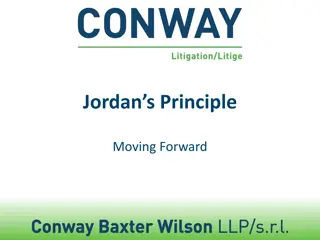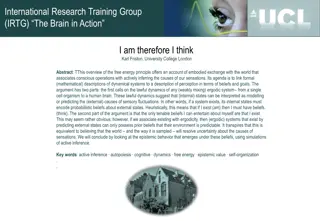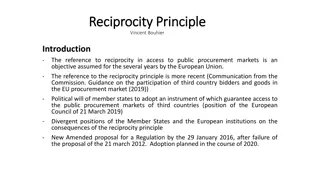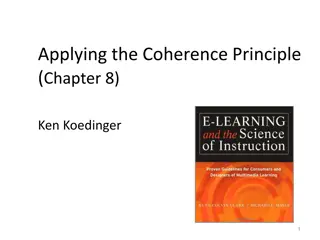Audi Alteram Partem
Explore the fundamental concept of fairness and justice in human society through the principle of Audi Alteram Partem, which ensures that both sides are heard before passing a judgement. This principle is a basic requirement of the rule of law and is essential for upholding civilised society.
1 views • 35 slides
Heisenberg's Uncertainty Principle in Elementary Quantum Mechanics
Heisenberg's Uncertainty Principle, proposed by German scientist Werner Heisenberg in 1927, states the impossibility of simultaneously and accurately determining the position and momentum of microscopic particles like electrons. This principle challenges classical concepts of definite position and m
0 views • 49 slides
Counting Principles and Pigeonhole Principle Explained
Explore the concepts of counting principles and the pigeonhole principle through practical examples and tips. Learn how to apply these principles to solve problems effectively. From understanding basic counting rules to the advanced pigeonhole principle, this content provides insights and guidance o
2 views • 35 slides
Curtin UniReady in Schools Program Overview
The Curtin UniReady in Schools Program provides year 12 students with an alternative pathway to university, offering a notional ATAR of 70 and English competency. The program consists of core units focusing on academic writing and communication skills, along with elective units covering mathematics
1 views • 13 slides
Classical Mechanics: Variational Principle and Applications
Classical Mechanics explores the Variational Principle in the calculus of variations, offering a method to determine maximum values of quantities dependent on functions. This principle, rooted in the wave function, aids in finding parameter values such as expectation values independently of the coor
1 views • 16 slides
Key Terms in Ch. 21: Reaction, Revolution, and Romanticism, 1815-1850
The key terms discussed in Chapter 21 include principle of legitimacy, balance of power, ideology, conservatism, principle of intervention, ultraroyalists, ministerial responsibility, and liberalism. These terms highlight important political philosophies and concepts during the post-Napoleonic era a
0 views • 17 slides
Le Chatelier's Principle in Chemical Equilibrium
Le Chatelier's Principle states that when a system at equilibrium is disturbed by changes in concentration, temperature, or pressure, the equilibrium shifts to counteract the change. This principle can be applied to predict the direction of equilibrium when changes occur. Changes in concentration, p
0 views • 10 slides
Theories of Reinforcement in Behavioral Economics
Explore key theories of reinforcement including Thorndike's Law of Effect, Hull's Drive Reduction Theory, the Premack Principle, Response-Deprivation Hypothesis, and Behavioral Economics concepts such as Response Allocation. Learn about reinforcers as stimuli, primary and secondary reinforcers, the
3 views • 9 slides
The Hammett Equation in Chemical Reactions
The Hammett equation explores how substituents influence the dissociation of benzoic acid, affecting its acidity. By quantifying this influence through a linear free energy relationship, the equation helps predict the impact of substituents on different processes. Through parameter definitions and m
0 views • 9 slides
The Multiplication Counting Principle in Probability
The Multiplication Counting Principle and Permutations play a crucial role in determining the number of possible outcomes in various processes. This lesson covers how to use factorials to count permutations, compute arrangements of individuals, and apply the multiplication counting principle to dete
0 views • 14 slides
Hammett Parameters in Organic Chemistry
The Hammett Parameters analysis, particularly the Hammett Plot, is a valuable tool in studying the electronic effects of substituents on aromatic systems. This linear free-energy relationship approach aids in optimizing reaction conditions and probing reaction mechanisms. Applications of Hammett Par
1 views • 8 slides
Jordan's Principle and Its Impact on First Nations and Inuit Children in Canada
Jordan's Principle was named in memory of Jordan River Anderson, a young boy whose tragic story led to the establishment of a legal requirement ensuring access to services for First Nations and Inuit children in Canada without delays or disruptions. This principle aims to prevent situations where ch
1 views • 9 slides
Fundamentals of Asymmetric Catalysis: Energetics and Principles
Exploring the principles and energetics of asymmetric catalysis, this study delves into the importance, classes of transformations, stereoselectivity, and transmission of asymmetry. It discusses reaction coordination diagrams, transition state stabilization, and the terminology of catalysis. The Cur
2 views • 20 slides
Fluids, States of Matter, and Phase Changes
Exploring key concepts in physics including Bernoulli's Principle, viscosity, cohesion, states of matter (solid, liquid, gas, plasma), phase changes (evaporation, condensation, etc.), density, pressure, and more. Discover the properties and behaviors of fluids in relation to gases and liquids, along
2 views • 54 slides
The Acceleration of the Universe and the Equivalence Principle Violation in the Horndeski Vector-Tensor Theory
Exploring the implications of the Equivalence Principle Violation after reheating in the context of the accelerated expansion of the universe. The study delves into the Horndeski vector-tensor theory, gravitational waves, and the impact of modified gravity and dark energy. Insights are provided on t
2 views • 20 slides
Production Planning in e-Prelude.com Tour: Session 6 Overview
This session focuses on production planning in the context of e-Prelude.com Tour, emphasizing the purpose, demand, calculations, MRP principle, and gross requirements in the manufacturing process. It covers areas like satisfying customer orders, managing inventory levels, calculating quantities, and
0 views • 34 slides
The Multiplication Counting Principle in Probability: Exploring Permutations
Exploring the multiplication counting principle in probability, this lesson delves into determining the number of ways to complete a process involving multiple steps. Using factorials for permutations, the content showcases how to compute permutations of individuals taken at a time. Through examples
0 views • 20 slides
Applying the Black Box Principle to Pediatric Cardiac Surgery: A Study
This study explores the application of the Black Box Principle in pediatric cardiac surgery, adapting the concept from aviation to enhance safety and performance in the operating room. By recording all failure events in real-time and analyzing data over a period of time, the study aims to improve ou
0 views • 13 slides
Jeremy Bentham and Utilitarianism
Jeremy Bentham, a late 18th-century British philosopher, introduced Utilitarianism, a moral philosophy focused on maximizing happiness and minimizing pain. He believed that all actions are motivated by pleasure and pain, and that the principle of utility judges actions based on their impact on happi
0 views • 17 slides
Australia's Shift: World War II and the Reorientation of Alliances
During World War II, Australia's relationship with Britain and the United States shifted dramatically due to the changing dynamics of global warfare. The country found itself in a vulnerable position, prompting a strategic reevaluation of alliances. Prime Minister Curtin's declaration marked a pivot
0 views • 11 slides
Hardy-Weinberg Principle and Genetic Frequencies
Gene pool and allele frequencies play a crucial role in the Hardy-Weinberg Principle, a mathematical model predicting allele frequencies over generations. The principle outlines conditions like a large population, absence of mutations, random mating, and more. Equations such as p² + 2pq + q² = 1 h
0 views • 44 slides
Proportionality Principle in Liquidity Risk Management
The concept of proportionality is essential in evaluating measures related to liquidity risk management in the banking sector. The principle emphasizes the necessity for measures to be appropriate, necessary, and not disproportionally disadvantageous. By applying a 3-stage test, institutions can ens
1 views • 10 slides
Curtin Specialist Mentoring Program (CSMP) for Autism Spectrum Students
The Curtin Specialist Mentoring Program (CSMP) is designed to support tertiary students on the autism spectrum and related conditions by providing specialist mentoring and necessary accommodations. The program addresses the increasing rates of autism spectrum disorder diagnoses in Australia and the
0 views • 18 slides
Effective Performance Management Strategies in Not-for-Profit and Public Sector Entities
Explore key challenges and practical steps for enhancing performance management in not-for-profit and public sector organizations, presented by Professor David Gilchrist from Curtin University. Addressing issues such as reform fatigue, risk avoidance, and the importance of performance reporting and
0 views • 7 slides
Effective Application of FITT Principle for Muscular Strength and Endurance Training
Utilize the FITT Principle to design a workout plan for enhancing muscular endurance and strength. Understand the frequency, intensity, time, and types of exercises needed for optimal results. Modify and adjust elements regularly to prevent plateaus and overuse injuries. Focus on FIIT and injury pre
0 views • 14 slides
Principle of Majority Rule in Company Law
The principle of majority rule is a fundamental aspect of company law, where the powers of control over a company rest with the general meeting representing the majority shareholders. This principle emphasizes that decisions are made by a simple or special majority vote, except for powers vested in
0 views • 9 slides
Proportionality as Core Principle in Supervising Heterogeneous Banking Sectors: Lessons from Germany
The supervision of a diverse banking sector, such as Germany's with roughly 2,000 banks, is based on the core principle of proportionality. This approach involves tailoring regulations and oversight to fit the individual characteristics of each institution, focusing on qualitative aspects, organizat
0 views • 8 slides
Implementation of European Code of Conduct on Partnership in Czech Republic: Meeting Overview
Meeting held in Prague on November 4, 2022, discussed the implementation of the European Code of Conduct on Partnership in the Czech Republic. The agenda included goals such as understanding the partnership principle, clarifying development mechanisms, and exploring its application in EU financial f
0 views • 10 slides
Influence of Fermionic Exchange Symmetry Beyond Pauli's Exclusion Principle
Christian Schilling from the University of Oxford delves into quantifying the impact of fermionic exchange symmetry, going beyond Pauli's exclusion principle. The study explores generalized Pauli constraints, concrete systems analysis, and the relevance of (quasi) pinning. Collaborating with various
0 views • 27 slides
Jordan's Principle: Advocating for First Nations Children's Rights
Jordan's Principle is a vital advocacy tool aimed at ensuring equitable access to necessary services for First Nations children, emphasizing prompt resolution of jurisdictional disputes. Originating from the story of Jordan River Anderson, its implementation has faced challenges and legal battles. C
0 views • 21 slides
Implementation Status of the Once-Only Principle in European Countries
Insights into the adoption and implementation of the Once-Only Principle (OOP) in European countries, including findings, strategies, initiatives, legislation, and establishment of authentic sources to support data reuse. The data showcases the progress made by various countries in implementing the
0 views • 17 slides
The Free Energy Principle and Active Inference in Cognitive Dynamics
This overview of the free energy principle by Karl Friston delves into how conscious operations are linked to inferring causes of sensations, emphasizing the necessity of probabilistic beliefs about external states. The discussion includes topics like embodied exchange with the world, ergodic system
0 views • 32 slides
Thin Layer Chromatography: Introduction, Principle, Methodology, and Applications
Thin Layer Chromatography (TLC) is a technique for separating and identifying compounds in a mixture based on adsorption. The principle involves the relative affinity of components to the stationary and mobile phases. The methodology is similar to paper chromatography, using coatings like silica gel
0 views • 21 slides
The Pigeonhole Principle in Mathematics
The Pigeonhole Principle, demonstrated through examples and explanations by Dr. J. Frost, illustrates the concept that if you have more "pigeons" than "holes," then at least one "hole" must contain multiple "pigeons." This fundamental principle is essential in solving various mathematical problems i
0 views • 27 slides
School Discipline in Massachusetts: 2015 Data & Reporting Requirements
This presentation by Robert Curtin on school discipline in Massachusetts examines the 2015 data and reporting requirements set by the Massachusetts Department of Elementary and Secondary Education. The data shows a decrease in the number of students disciplined, with efforts to address suspension ga
0 views • 9 slides
The Reciprocity Principle in Public Procurement Markets
The concept of reciprocity in access to public procurement markets, particularly in the European Union, has gained prominence in recent years. This principle involves mutual opening obligations for public procurement markets while considering concessions and exceptions, such as excluding defense and
0 views • 4 slides
Curtin UniReady Program - Pathway to University Success
The Curtin UniReady Program offers a pathway for Year 12 students to gain entry to university by completing Core and Elective units focusing on academic writing, communication, mathematics, and health sciences. Successful completion provides a notional ATAR of 70 and English competency, meeting Curt
0 views • 13 slides
Writing Lab: Principal vs. Principle
Learn the differences between "principal" and "principle" with this informative Writing Lab mini-lesson. Understand their varied meanings as nouns and adjectives, and how they are used in different contexts. Enhance your diction skills and avoid common usage errors. Enjoy learning about the principa
0 views • 4 slides
Enhancing Student Learning Through Coherence Principle
The Coherence Principle emphasizes the importance of excluding extraneous, entertaining materials to improve student learning. Including such materials can compete for cognitive resources and divert attention from essential information. Utilizing simpler visuals and avoiding websites that violate th
0 views • 7 slides
The Generalized Pigeonhole Principle in Discrete Math
The Generalized Pigeonhole Principle is illustrated through an example involving selecting cards from a deck. By strategically grouping the cards, we determine the minimum number needed to guarantee at least three cards of the same suit are chosen. Additionally, the process is applied to finding the
1 views • 5 slides







